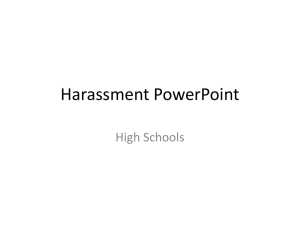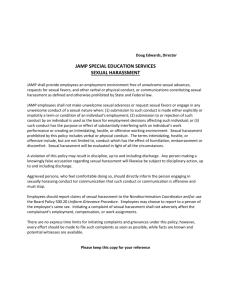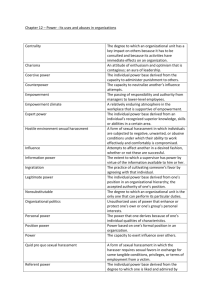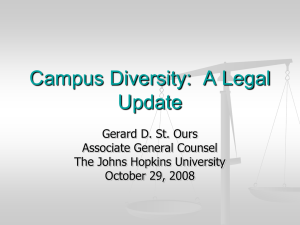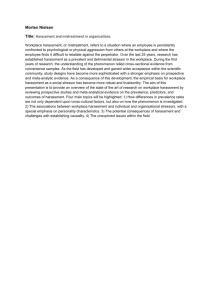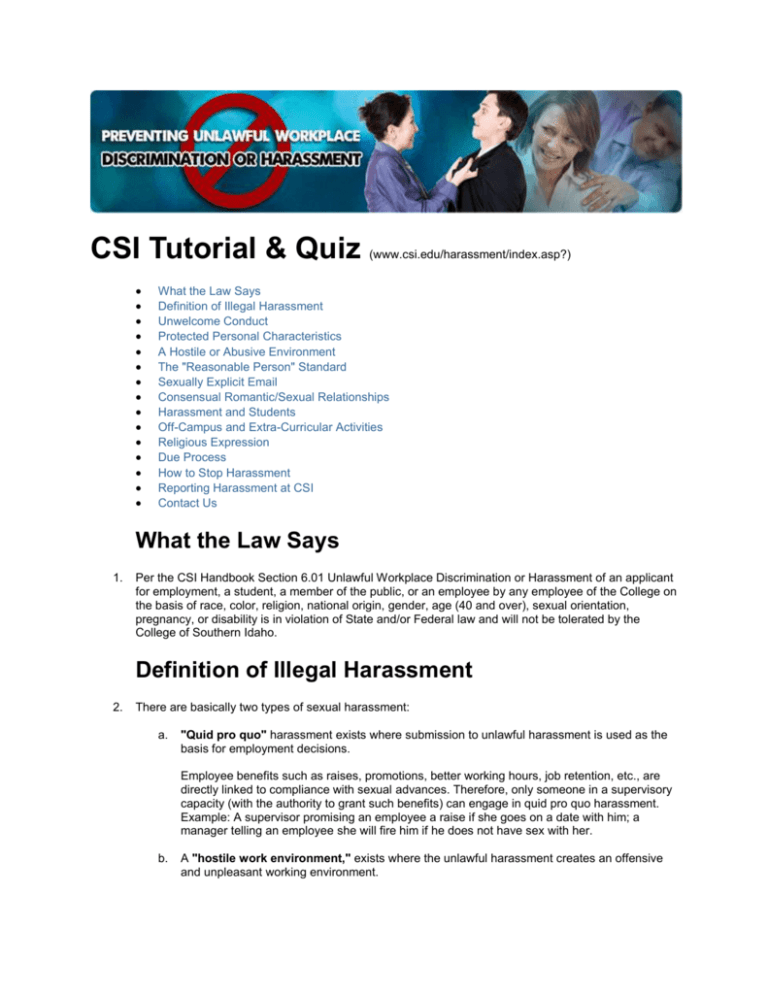
CSI Tutorial & Quiz
(www.csi.edu/harassment/index.asp?)
What the Law Says
Definition of Illegal Harassment
Unwelcome Conduct
Protected Personal Characteristics
A Hostile or Abusive Environment
The "Reasonable Person" Standard
Sexually Explicit Email
Consensual Romantic/Sexual Relationships
Harassment and Students
Off-Campus and Extra-Curricular Activities
Religious Expression
Due Process
How to Stop Harassment
Reporting Harassment at CSI
Contact Us
What the Law Says
1.
Per the CSI Handbook Section 6.01 Unlawful Workplace Discrimination or Harassment of an applicant
for employment, a student, a member of the public, or an employee by any employee of the College on
the basis of race, color, religion, national origin, gender, age (40 and over), sexual orientation,
pregnancy, or disability is in violation of State and/or Federal law and will not be tolerated by the
College of Southern Idaho.
Definition of Illegal Harassment
2.
There are basically two types of sexual harassment:
a.
"Quid pro quo" harassment exists where submission to unlawful harassment is used as the
basis for employment decisions.
Employee benefits such as raises, promotions, better working hours, job retention, etc., are
directly linked to compliance with sexual advances. Therefore, only someone in a supervisory
capacity (with the authority to grant such benefits) can engage in quid pro quo harassment.
Example: A supervisor promising an employee a raise if she goes on a date with him; a
manager telling an employee she will fire him if he does not have sex with her.
b.
A "hostile work environment," exists where the unlawful harassment creates an offensive
and unpleasant working environment.
A hostile work environment can be created by anyone in the work environment, whether it is
supervisors, other employees, or the public. Hostile environment harassment includes, but is
not limited to, verbiage of a sexual nature, unwelcome sexual materials, or even unwelcome
physical contact as a regular part of the work environment. Cartoons or posters of a sexual
nature, vulgar or lewd comments or jokes, or unwanted touching or fondling all fall into this
category.
3.
Definition of illegal harassment: Harassment is unwelcome conduct toward a person with a protected
personal characteristic and which creates an abusive work environment. The three main requirements
of illegal harassment are that it is unwelcome conduct, involves a protected characteristic and creates
a hostile or abusive environment.
Unwelcome Conduct
4.
Unwelcome conduct is both offensive to the victim and is not solicited or invited.
5.
Behaviors that can be unwelcome and/or sexual in nature:
a.
b.
c.
Physical: assault, touching, blocking, hugging, kissing, pinching, patting, leering, gesturing,
grabbing, etc.
Verbal: jokes, remarks or questions; propositions for sexual activity; pressure for dates;
obscene language which is gender specific or sexual in nature; inappropriate comments about
a person's body, etc.
Visual: cartoons, written documents, pin-up calendars, drawings, computer images or games,
posters, objects, faxes, emails, etc.
Protected Personal Characteristics
6.
Protected personal characteristics recognized by the federal and state of Idaho governments include:
of race, color, religion, national origin, sex, age (40 and over) pregnancy or disability.
A Hostile or Abusive Environment
7.
A hostile/abusive environment exists when: There is verbal or nonverbal behavior in the workplace
focusing on a protected characteristic, the behavior is unwanted or unwelcome, and the behavior is
severe or pervasive enough to affect the person's work environment.
8.
A work environment is objectively abusive if a "reasonable" person would find the environment
abusive. Factors in deciding whether the environment is objectively abusive include:
a.
b.
c.
d.
e.
Frequency
Severity
Physically threatening or humiliating
Unreasonably interferes with job performance
Affects psychological well-being
The "Reasonable Person" Standard
9.
The reasonable person standard is used by courts in determining whether a person's comments or
behavior violate prohibitions against harassment. The question is whether a "reasonable person" in the
alleged victim's circumstances would find the comment or conduct unwelcome and whether it would
create a hostile work environment.
Sexually Explicit Email
10. Sexually explicit jokes or email at work can be perceived as promoting a harassing environment if the
materials are forwarded or kept. Simply opening the email is not a violation; however, distributing it
from work is a violation of college policy. The college suggests that you advise others not to send such
materials to your workplace email program.
Consensual Romantic/Sexual Relationships
11. According to CSI policy, consensual romantic and/or sexual relationships between supervisors and
employees and between instructors or staff and students involve power differentials and raise serious
concerns about the validity of the consent, as well as concerns about conflicts of interest, abuse of
power, and sexual harassment. What might appear to be consensual, even to one of the parties
involved, may in fact not be so, when one of the individuals involved in the relationship is in a
subordinate position to the other.
12. When a romantic and/or sexual relationship develops between that individual having a position of
authority over another within the college, the person in authority must remove themselves from any
activity or evaluation that may reward or penalize the student or employee and must inform their
supervisor about the situation.
Harassment and Students
13. The ASCSI Senate shall not discriminate on the basis of age, race, color, gender, sexual orientation,
religion, disability, veteran’s status, or national origin. Harassment can occur if unwelcome conduct
related to a protected characteristic limits the student's ability to participate in or benefit from an
educational program or creates an abusive environment. A hostile learning environment can be
created by an employee, student or others on campus.
14. A romantic or sexual relationship between an instructor and a student is not unlawful, but romantic
relationships between students and instructors can cause problems if the student is a minor – as a
sexual relationship could be illegal or the student may later come to believe the relationship was not
truly consensual. Romantic relationships with students should be avoided, and especially relationships
with students where the employee involved is the student's instructor, supervisor or coach.
Off-Campus and Extra-Curricular Activities
15. The law protects students from harassment that occurs in connection with any educational or extracurricular program, whether or not the harassment takes place on campus. An employee should
immediately report any allegations of harassment that is reported or made known.
Religious Expression
16. Federal law (Title VII of the Civil Rights Act) and the laws of most states prohibit employers from
engaging in religious discrimination -- that is, discriminating based on an applicant's or employee's
religion. If you are allowed to post personal materials in your workplace, you may generally display
religious materials. But you should not display materials that demean or put down other religious
beliefs or lack of religious beliefs. Posting materials that demean other religious beliefs creates a
hostile workplace environment.
Due Process
17. CSI follows the practice of due process; i.e., the right to be heard in his or her own defense to provide
an equitable method for the administrative resolution of complaints without coercion, restraint, or
reprisal against any employee for filing or for involvement in a complaint, and to establish a uniform
method of filing a complaint.
How to Stop Harassment
18. What you can do if you are the person being harassed:
a.
b.
c.
d.
Tell the harasser to stop. Don't joke back. Make it very clear that you do not like the
harassing behavior.
Report the harassment to your supervisor, the Director of Human Resources or the
Director of Student Activities. If the harasser is your supervisor, report to the next level of
authority. Keep working your way up the chain of command until somebody listens to you
Keep records. Write letters or memos that include the person or persons involved, dates, the
specific offensive actions and witnesses if you have them.
Tell somebody. Co-workers or fellow students should support each other against harassing
behavior.
Reporting Harassment at CSI
19. According to CSI policy and procedure, any account of harassment reported by a student, member of
the public or fellow employee is to be taken seriously and reported immediately to the Director of CSI
Human Resources or Dean of Students.
20. If an employee or student complains to you about sexual harassment:
a.
b.
c.
d.
Listen - Take the information seriously.
Encourage the harassed employee or student to say "no."
Take action - Follow the procedures outlined in the CSI Unlawful Workplace Discrimination
and Harassment Policy.
Take action immediately - You are responsible to uphold this policy and report any instances
of discrimination or harassment.
Contact Us
21. Persons to contact about discrimination or harassment complaints:
a.
The Director of Human Resources, 732-6267 or
b. The Dean of Students, 732-6221
Rev: 2/15



